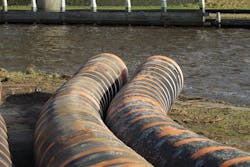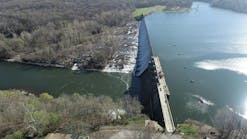BEAVER DAM, WI & PITTSBURGH, SEPT 15, 2017 --Evoqua has announced the successful installation and commissioning of two ETS-UV™ systems for Rushville, Indiana's initiative to support a "Living Greener" life.
Evoqua was selected to supply two ETS-UV™ SW-1250-20 ultraviolet (UV) disinfection systems to complete the Rushville's Combined Sewer Overflow (CSO) Long Term Control Plan. The UV equipment will effectively treat the plant's wastewater and also respond to CSO. CSOs occur when flows exceed the hydraulic capacity of the combined stormwater and wastewater to the treatment plant. As the community has grown, surfaces have increased and, as a result, so has the amount of stormwater directed to the treatment facility. Consequently, during extreme wet weather events, overflow is released into a nearby receiving body of water. Rushville's plan protects the Flatrock River by making a safe release of excess water through filtration and disinfection methods.
The method used to disinfect CSO water has traditionally been chlorination. However, the growing awareness of the adverse environmental impacts associated with the byproducts of chlorination has led to increasingly restrictive chlorine residual requirement. UV disinfection is an efficient, low cost and an environmentally friendly way to disinfect water. The process is safer for operators and the community; UV is a chemical free process that adds nothing to the water. Unlike chlorine, UV disinfection is able to inactivate pathogens such as Giardia and Cryptosporidium. Discharged wastewater with these pathogens can be dangerous for drinking water supplies and recreational water.
ETS-UV systems were selected because of the compact design, least number of components and unique product features. The ETS-UV SW systems are designed in a small footprint with an access hatch to eliminate flow disruptions and air pockets. This feature makes routine maintenance easier on the chamber eliminating the need to remove the end flanges. The systems also have low voltage automatic wipers to keep quartz sleeves clean to prevent fouling, allowing the valuable UV energy to penetrate the water. The system is fully automated to respond to variable flow and water quality without wasting unnecessary power.
"Applying UV disinfection technology is an environmentally friendly option for cities to meet the challenges associated with combined sewer overflow. The process protects wetlands, aquatic species and supports a healthy ecological habitat," said Jon McClean, VP of Research, Development and Engineering, Aquatics and Disinfection.
Learn more atwww.evoqua.com/ets-uv



